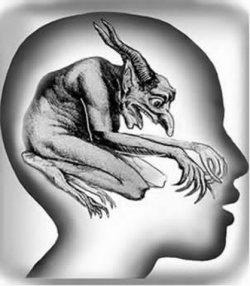Difference between revisions of "Irshya"
Jump to navigation
Jump to search
m (1 revision: Adminos 7 october) |
|||
| (5 intermediate revisions by 2 users not shown) | |||
| Line 1: | Line 1: | ||
[[File:Mind-control-302.jpg|thumb|250px|]] | [[File:Mind-control-302.jpg|thumb|250px|]] | ||
| − | [[Irshya]] ([[Sanskrit]], also [[īrṣyā]]; [[Pali]]: [[issā]]; [[Tibetan]]: [[phrag dog]]) is a [[Buddhist]] term that is translated as "[[jealousy]]" or " | + | {{WIKISeealso|Envy}} |
| + | [[Irshya]] ([[Sanskrit]], also [[īrṣyā]]; [[Pali]]: [[issā]]; [[Tibetan]]: [[phrag dog]]) is a [[Buddhist]] term that is translated as "[[jealousy]]" or "{{Wiki|envy}}". It is defined as a [[state of mind]] in which one is highly agitated to obtain [[wealth]] and {{Wiki|honor}} for oneself, but unable to bear the [[excellence]] of others | ||
[[Irshya]] is identified as: | [[Irshya]] is identified as: | ||
| Line 8: | Line 9: | ||
* One of the ten [[fetters]] in the [[Theravada]] [[tradition]] (according to the [[Dhammasangani]]) | * One of the ten [[fetters]] in the [[Theravada]] [[tradition]] (according to the [[Dhammasangani]]) | ||
* One of the twenty subsidiary [[unwholesome]] [[mental factors]] within the [[Mahayana]] [[Abhidharma]] teachings | * One of the twenty subsidiary [[unwholesome]] [[mental factors]] within the [[Mahayana]] [[Abhidharma]] teachings | ||
| − | * One of the five poisons within the [[Mahayana]] [[tradition]] | + | * One of the [[five poisons]] within the [[Mahayana]] [[tradition]] |
* Belonging to the category of [[anger]] ([[Sanskrit]]: [[pratigha]]) within the [[Mayahana]] [[tradition]] | * Belonging to the category of [[anger]] ([[Sanskrit]]: [[pratigha]]) within the [[Mayahana]] [[tradition]] | ||
| Line 17: | Line 18: | ||
[[Category:Buddhist Terms]] | [[Category:Buddhist Terms]] | ||
[[Category:Buddhist psychology]] | [[Category:Buddhist psychology]] | ||
| + | [[Category:Kleshas]] | ||
Latest revision as of 02:03, 7 October 2013
- See Also in Wikipedia :
Irshya (Sanskrit, also īrṣyā; Pali: issā; Tibetan: phrag dog) is a Buddhist term that is translated as "jealousy" or "envy". It is defined as a state of mind in which one is highly agitated to obtain wealth and honor for oneself, but unable to bear the excellence of others
Irshya is identified as:
- One of the fourteen unwholesome mental factors within the Theravada Abhidharma teachings
- Belonging to the category of dosa within the Theravada tradition
- One of the ten fetters in the Theravada tradition (according to the Dhammasangani)
- One of the twenty subsidiary unwholesome mental factors within the Mahayana Abhidharma teachings
- One of the five poisons within the Mahayana tradition
- Belonging to the category of anger (Sanskrit: pratigha) within the Mayahana tradition
